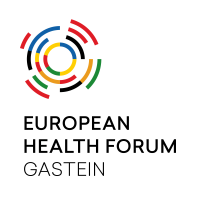by Bianca Cucos.
Each year, the European Health Forum Gastein (EHFG) provides a key platform to discuss health and societal well-being in Europe and beyond, bringing together experts, stakeholders and key decision-makers from the public and private sector, civil society and science and academia. On the occasion of the 24th EHFG, the topic of rare diseases was high on the agenda with discussions on the current challenges facing patients and possible solutions to ensure equitable access to treatment.
During the “New partnership models for rare diseases” session, Dimitrios Athanasiou, Board Member of the European Patients‘ Forum and father of a child with a rare genetic disorder, acknowledged “If you are two kilometers apart, but on the wrong side of the border, you die.” This stark message illustrates how inequitable access to care in Europe is, and why new ideas on how to tackle this are needed.
The delay between market authorization and patient access to orphan drugs is between three months and three years, depending in which part of Europe the patient is from. According to recent results from the Patients W.A.I.T. Indicator Survey, time to availability for orphan drugs in Germany is around 100 days, while for patients in Poland and Lithuania it is over 1000 days.
Despite great improvements in orphan drug approvals over the past 20 years, only five percent of rare diseases have an authorized treatment. Half of rare disease patients are children, and a third of them do not reach their fifth birthday. Research is the cornerstone for reducing the burden of rare diseases on patients and families, but it is currently conducted in silos and there are not enough incentives for investment. The standard R&D pathway for rare diseases can take decades, without the certainty of getting the designation of an orphan drug.
Through collaboration and investments for the common good, the knowledge generated in the lab can offer solutions rapidly and equitably for medical problems.
One of the lessons from the COVID-19 pandemic is that research should have a vision. Processes that would have taken years were much accelerated by partnerships between universities and industry, and a great coordination came from governments. A similar approach, built on collaboration could make a change for rare diseases. Governments could stimulate more cooperation between academia and companies and more investments in translational research.
Unmet Needs (UNM):
The scale of the UNM must be better defined when it comes to rare diseases. One such UMN is understanding the prevalence and nature of rare diseases.
More than 7000 genetic disorders have been identified to date and, as the multi-omics revolution advances, it is likely that many more rare conditions will be found. Adopting digital technologies and establishing a common data infrastructure will become essential requirements to facilitate better use of existing knowledge and help prioritize areas for investment.
Lifesaving, innovative therapies already on the market, prove most benefits for pre-symptomatic patients, therefore another UNM is optimizing newborn screening (NBS) programs.
Due to advances in biotechnology, up to 20 gene and cell therapies are expected to enter the market annually in the next decade. In the EU, these are classified as ATMPs (advanced therapy medicinal products) and are completely different from conventional drugs. Some products work by introducing a “normal” version of a gene to the body, a one-time therapy with potential lifetime benefits. For many cases this is the only therapy available but most importantly the benefits are close to a “cure”. Type I SMA (spinal muscular atrophy), for example, is a fatal neuromuscular disorder, associated with a life expectancy of just two years. Recent results show that babies treated with a gene therapy can achieve age-appropriate motor milestones and long-term survival.
How do you ensure access to a magic bullet, when health systems still focus on
volume, rather than value, and cannot foresee that we are entering an era of
customizable `n-of-1 therapies`?
Stakeholders debating at this year’s EHFG agree on the need for a pan-European approach for rare diseases R&D and reimbursement. Rare diseases need a clear governance structure and functional cross-border healthcare framework that is able to provide patients with equitable access to innovation.
Early detection, availability of registries, data sharing frameworks, and access to clinical trials are all chapters marked by differences within and between countries. The specificities of orphan drugs require re-thinking of the whole continuum of care.
Generating evidence for policymaking is a crucial point that requires coordination from multiple players. In many countries, civil society is making important efforts to source funding for expensive drugs, to take the initiative for building registries and even generating alternative public policies, bringing rapidly evolving knowledge to the table of decision makers. Efforts need to be coordinated and all contributions recognized. New partnerships with continuous dialogue between stakeholders and early engagement with authorities are ways to move ahead and address the current burden of inequalities.
A model for risk sharing, that all health systems contribute to, along with mechanisms that can balance differences in GDPs could be solutions for fair pricing and equal access to innovation across the 27 member states. We need a European fund that all health systems pay into with a European agency in charge of distributing the money as well as a European body for financing clinical trials.
Creating ‘pilots’ of multistakeholder cooperation for the entire pathway was one of the solutions identified during another EHFG 2021 session, “A better tomorrow for rare diseases care and research“. The current Orphan Medicinal Products (OMP) Regulation review is an opportunity to rethink the care for rare diseases in Europe from a multistakeholder perspective.
As discussed in Gastein, virtually this time, rare diseases must become a priority in Europe’s recovery plans. We can do better… Maybe it is time for a European Plan for rare diseases.
About the author
Bianca Cucos is a medical doctor specializing in genetics and currently working as a health consultant at the Center for Innovation in Medicine, a civil society organization focused on health innovation policy, research, and education. The themes she covers are related to genomics, personalized healthcare, precision oncology, and biotechnology. She has been involved in advocacy & research projects about reducing health inequalities in cancer care and improving cancer literacy, with a focus on specific challenges in the CEE. Since the beginning of the pandemic, she has also been contributing to research regarding genomic surveillance to improve the public health response in Romania. In the past two years, she has been participating in the Young Forum Gastein program, aiming to build new skills in policy and public health.

Citation:
Cucos, Bianca: New partnership models for rare diseases (In: Polak, G. [ed.]: GI-Mail 02/2022, ISSN: 2312-0827 Going International, Vienna 2022
Published in GI-Mail 02/2022 (English edition).
- Do you already know our monthly newsletter GI-Mail with useful tips on postgraduate courses?
Sign up here. - Are you looking for vacancies or new career challenges? Here you will find the latest vacancies and job offers.
- Do you already know our monthly job-information GI-Jobs with current job offers for doctors, managers and nurses? Sign up here.
- Are you interested in up to date postgraduate courses and CME? In our education database »medicine & health« you will find new education events from over 2300 organizers.


